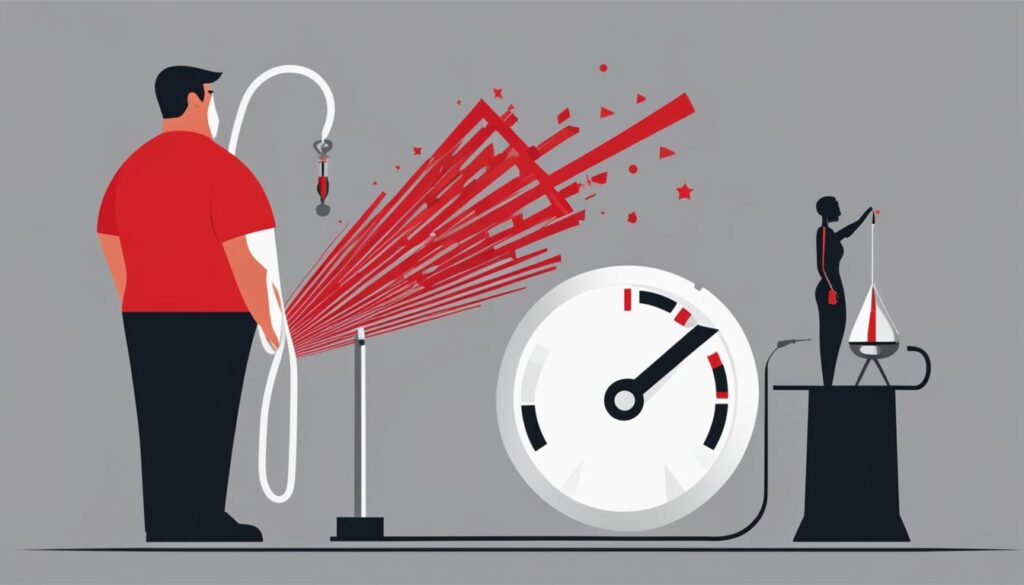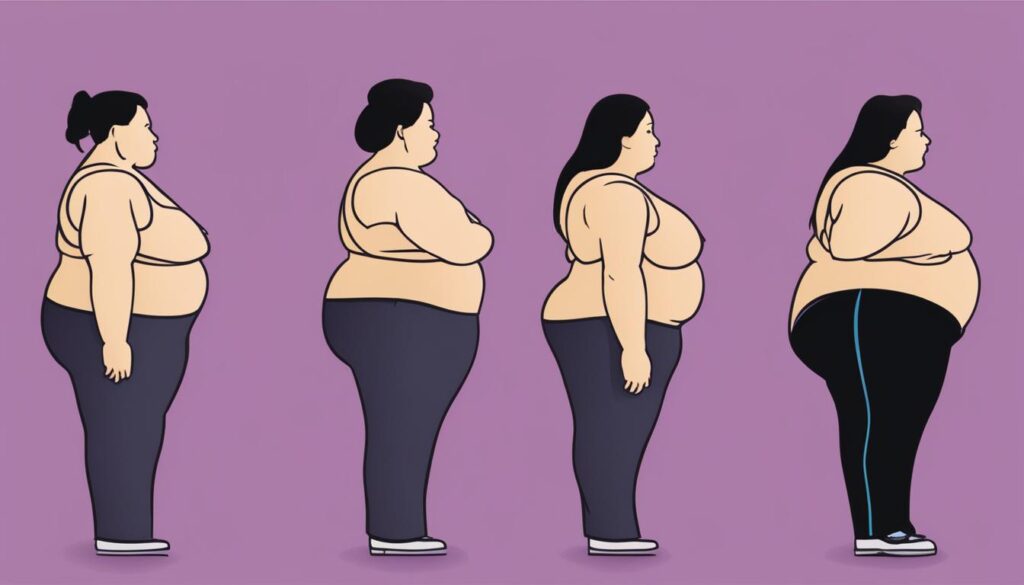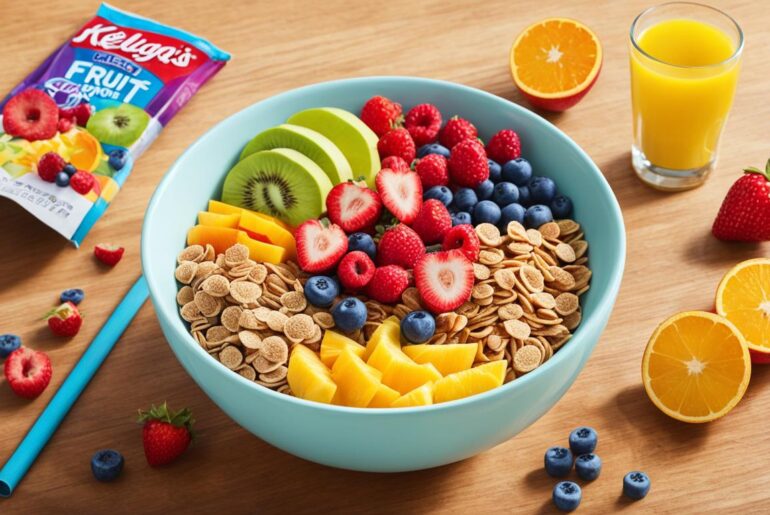Preparing for liposuction involves taking certain steps to ensure safety and achieve optimal results. While there is no specific weight requirement for liposuction, it is recommended to reach your target weight or get close to it several months before the procedure. This allows for better visibility of the results and enhances the overall outcome of the surgery. In addition to weight management, focusing on building muscle and following a healthy diet can further enhance the results of liposuction.
Key Takeaways:
- Losing weight before liposuction can improve the visibility of results.
- Reaching your target weight or getting close to it is recommended before the procedure.
- Building muscle and following a healthy diet can enhance the outcomes of liposuction.
- There is no specific weight requirement for liposuction.
- Consult with a plastic surgeon for personalized guidance on liposuction preparation.
The Importance of Reaching Your Target Weight
When considering liposuction, many patients wonder if they need to reach a specific weight beforehand. While there is no set weight requirement, reaching your target weight or getting close to it before the procedure is highly beneficial. Liposuction is not intended as a weight loss method but rather as a way to target stubborn fat areas that have been resistant to diet and exercise.
By achieving your desired weight prior to liposuction, you can enhance the overall outcome of the procedure and ensure that the results are more visible. This is because liposuction works best when there is less overall fat to be removed, allowing for greater precision and contouring.
“By achieving your desired weight prior to liposuction, you can enhance the overall outcome of the procedure and ensure that the results are more visible.”
Reaching your target weight before liposuction also allows for a more accurate assessment of your body shape and proportions. This helps your plastic surgeon determine the best approach and discuss realistic expectations for the procedure.
The Benefits of Reaching Your Target Weight:
- Enhanced precision and contouring
- More visible results
- Improved assessment of body shape and proportions
- Realistic expectations for the procedure
Reaching your target weight before liposuction is not only important for optimizing the results of the procedure but also for maintaining those results in the long term. It sets the foundation for a healthier lifestyle and ensures that your body remains in proportion even after any potential future weight fluctuations.
| Benefits of Reaching Target Weight Before Liposuction |
|---|
| Enhanced precision and contouring |
| More visible and defined results |
| Improved assessment of body shape and proportions |
| Long-lasting outcomes |
Ultimately, it is important to discuss your weight goals and target weight with your plastic surgeon during the consultation process. They will be able to provide personalized guidance and recommendations based on your unique situation and desired outcomes. Remember, reaching your target weight before liposuction not only enhances the procedure’s results but also contributes to your overall well-being and satisfaction.
The Benefits of Building Muscle Before Liposuction

When considering liposuction, many individuals focus solely on the removal of excess fat. However, it is important to note that liposuction can also reveal the underlying muscles, providing an opportunity to achieve a leaner and more sculpted appearance. Building muscle before undergoing liposuction can complement the results of the procedure and help you achieve a more defined physique.
By engaging in muscle toning exercises several months before your liposuction surgery, you can enhance the overall outcome and maximize the benefits. Toning your muscles not only improves their appearance but also enhances strength and promotes faster healing after the procedure.
The Link Between Exercise and Liposuction Results
Engaging in regular exercise before liposuction can help optimize the results of the procedure. By building muscle, you can create a more balanced and proportionate physique. Additionally, exercising before liposuction can help improve skin elasticity and promote better tissue healing, contributing to a smoother recovery process.
While specific exercises may vary depending on your individual goals and preferences, a combination of cardiovascular exercises and strength training can be beneficial. Cardiovascular exercises help burn calories and reduce overall body fat, while strength training focuses on specific muscle groups to enhance tone and definition.
| Recommended Exercises for Muscle Building | Benefits |
|---|---|
| Squats | Targets the lower body, particularly the glutes, thighs, and calves |
| Lunges | Strengthens the legs and improves balance |
| Push-ups | Tones the chest, shoulders, and triceps |
| Planks | Engages the core muscles, improving overall stability |
| Resistance training with weights or resistance bands | Targets specific muscle groups for increased strength and definition |
Remember to consult with your healthcare provider or a qualified fitness professional before starting any exercise regimen. They can provide personalized guidance based on your current fitness level and specific liposuction goals.
Building muscle before liposuction can help you achieve the body contouring results you desire. By combining exercise with liposuction, you can sculpt your physique and achieve a more defined appearance. However, it is essential to follow your plastic surgeon’s recommendations and maintain a healthy lifestyle after the procedure to optimize and maintain the results.
The Role of Diet in Liposuction Preparation
Maintaining a healthy diet is crucial before liposuction. A pre-liposuction diet can help boost overall health for better healing and increase skin elasticity. It is recommended to focus on foods high in antioxidants and water, such as berries, celery, cucumber, healthy oils, omega-3 fatty acids, squashes, and certain spices. Drinking plenty of water is also essential. Following a nutritious diet before liposuction not only enhances the results but also sets the foundation for long-term weight management and a healthier lifestyle.
To optimize the healing process after liposuction, it is important to incorporate specific foods into your pre-liposuction diet. These foods are rich in nutrients that promote healing and increase skin elasticity. Here are some essential food groups to include:
- Fruits and vegetables: Berries, citrus fruits, leafy greens, and cruciferous vegetables are packed with antioxidants and vitamins that support skin health and aid in the healing process.
- Healthy fats: Include foods high in healthy fats, such as avocados, nuts, and olive oil. These fats provide essential nutrients and promote better absorption of fat-soluble vitamins.
- Omega-3 fatty acids: Incorporate fatty fish like salmon, chia seeds, and flaxseeds into your diet. Omega-3 fatty acids have anti-inflammatory properties that can speed up the healing process and reduce inflammation.
- Hydrating foods: Opt for foods with high water content, like cucumber, watermelon, and celery. Staying hydrated is essential for overall health and promotes skin elasticity.
- Spices: Certain spices like turmeric and ginger have anti-inflammatory properties that can aid in the healing process. Incorporate these spices into your meals to enhance the flavor and provide potential health benefits.
A well-balanced diet not only prepares your body for liposuction but also sets the stage for long-term weight management. By adopting healthy eating habits and incorporating nutrient-dense foods, you can maintain your liposuction results and enjoy a healthier lifestyle. Remember to consult with your doctor or a registered dietitian to personalize your pre-liposuction diet plan.
“A pre-liposuction diet rich in antioxidants, healthy fats, and hydrating foods can promote better healing and increase skin elasticity.”
The Negative Effects of Nicotine on Liposuction Results

Quitting nicotine before liposuction is crucial for achieving optimal results and ensuring a successful procedure. The impact of nicotine on liposuction is significant, and it is important to understand the negative effects it can have on the outcome.
When nicotine is consumed, it restricts blood vessels and reduces blood flow throughout the body. This compromised blood flow can have detrimental effects on liposuction results. Proper blood flow is essential for a safe surgery and optimal recovery, as it ensures that the body receives necessary nutrients and oxygen for healing.
By quitting nicotine, including smoking, as soon as you schedule your liposuction procedure, you minimize the risks associated with restricted blood vessels. This not only improves the chances of achieving the desired liposuction results but also contributes to a smoother recovery process.
Table: Impact of Nicotine on Liposuction Results
| Effects of Nicotine on Liposuction | Possible Consequences |
|---|---|
| Restricted blood vessels | Decreased blood flow |
| Reduced nutrient and oxygen supply | Compromised healing process |
| Inhibited fat cell removal | Less effective fat reduction |
Quitting nicotine is an essential step in preparing for liposuction. By eliminating nicotine use from your life, you can optimize the chances of achieving the best possible results with liposuction.
Image:
Preparing Your Home for Liposuction Recovery
Before undergoing liposuction, it is essential to create a supportive environment at home for a smooth and comfortable recovery. Taking the time to prepare your home can greatly contribute to your overall well-being and enhance the healing process. Here are some tips for organizing your home and arranging for assistance during your liposuction recovery:
Gather Recovery Essentials
Make sure to have all the necessary items within easy reach of your bed. This includes comfortable clothing, such as loose-fitting tops and bottoms, that won’t irritate the treated areas. Additionally, consider purchasing a few extra-long charge cords for your electronic devices to ensure you can use them comfortably while resting.
Stock Up on Easy-to-Prepare Foods
Prioritize your recovery by stocking your pantry and refrigerator with easy-to-prepare meals and snacks. Opt for nutritious options that require minimal effort to prepare, such as pre-cut fruits and vegetables, frozen meals, or ready-to-eat soups. Having these convenient options on hand will alleviate the need for extensive meal prep and allow you to focus on rest and recovery.
Arrange for Help and Support
During your recovery period, it is essential to have assistance with daily tasks, especially if you have children or pets. Reach out to family, friends, or neighbors in advance and make arrangements for someone to help with childcare, pet care, or any other responsibilities that may require physical exertion. Having support in place will allow you to prioritize your recovery and minimize stress.
Create a Restful Environment
Designate a quiet and comfortable space in your home where you can rest, relax, and recover. Arrange pillows, blankets, and other comfort items to create a cozy and serene atmosphere. Consider using a white noise machine or soothing music to drown out any external distractions and promote a peaceful environment for a restful recovery.
By preparing your home for liposuction recovery, you can optimize the healing process and create a nurturing environment that supports your well-being. Taking the time to organize essentials, arrange for help, and create a restful space will contribute to a smoother recovery and help you achieve the best possible results from your liposuction procedure.
Liposuction as an Enhancement, Not Weight Loss

When considering liposuction, it is important to have realistic expectations about its purpose and limitations. Liposuction is not a weight loss procedure. Instead, it is a body contouring technique designed to target and remove small to moderate clusters of stubborn fat that have not responded well to diet and exercise.
Liposuction is most effective for individuals who are already at or near their target weight and are seeking to enhance their body’s shape and definition. It can help refine and sculpt specific areas such as the abdomen, thighs, hips, arms, or neck, creating a more contoured and proportionate appearance.
Unlike weight loss methods that aim to reduce overall body weight, liposuction focuses on localized fat deposits. It can address specific areas that may be resistant to traditional weight loss efforts, allowing for greater precision and targeted improvement.
Consulting with a qualified plastic surgeon is vital to determine if liposuction is the appropriate procedure for your specific goals and desired outcome. They can assess your individual needs and expectations to help establish realistic goals and explain the potential limitations of the procedure.
Remember, liposuction is not a substitute for healthy lifestyle choices. It is essential to maintain a stable weight and adopt a balanced diet and regular exercise routine to optimize the results of liposuction and enjoy long-lasting benefits.
Liposuction vs. Weight Loss
| Criteria | Liposuction | Weight Loss |
|---|---|---|
| Primary Purpose | Enhance body contour | Reduce overall body weight |
| Target | Localized fat deposits | Overall body fat |
| Suitable Candidates | Individuals at or near target weight | Individuals seeking significant weight reduction |
| Results | Localized fat reduction and improved body shape | Overall weight loss |
| Requirements | Stable weight and healthy lifestyle | Caloric deficit and exercise |
| Considerations | Realistic expectations and consultation with a plastic surgeon | Consistent lifestyle changes and long-term commitment |
Liposuction Candidates and Weight Maintenance

Eligibility for liposuction is not solely based on weight, but it is important to be at a stable, healthy weight before undergoing the procedure. Patients who have achieved their goal weight and have maintained it for at least 6-12 months are considered ideal candidates for liposuction. Weight maintenance is crucial for long-term liposuction results, as weight fluctuation can impact the outcome.
To maintain the results of liposuction, it is recommended to lead a healthy lifestyle with a balanced diet and regular exercise. This not only helps in maintaining the weight but also improves overall physical and mental well-being. Incorporating healthy habits such as portion control, eating nutrient-dense foods, and staying active can contribute to long-lasting results and enhance the overall satisfaction with the liposuction procedure.
The Importance of Liposuction Eligibility Criteria
Liposuction eligibility is determined by various factors other than weight. It includes factors such as overall health, skin elasticity, and the presence of underlying medical conditions. An assessment by a qualified plastic surgeon is essential to determine if liposuction is a suitable option for an individual. During the consultation, the surgeon will evaluate the patient’s medical history, perform a physical examination, and discuss their aesthetic goals to determine if liposuction is the right choice.
“Liposuction is not a one-size-fits-all procedure. Each patient is unique and requires careful evaluation to ensure their safety and optimal results.” – Dr. Jane Reynolds, Board-Certified Plastic Surgeon
Managing Weight After Liposuction
After undergoing liposuction, it is important to maintain a stable weight to preserve the results. Weight fluctuations can cause the remaining fat cells to expand, compromising the outcome of the procedure. Adopting healthy habits and developing a sustainable lifestyle plan can help in maintaining weight after liposuction.
Here are a few tips for maintaining weight after liposuction:
- Follow a balanced diet: Prioritize whole foods, plenty of fruits and vegetables, lean protein, and healthy fats. Avoid excessive consumption of processed foods, sugary drinks, and saturated fats.
- Stay active: Engage in regular physical activity, such as cardio exercises, strength training, or low-impact workouts, depending on your preferences and capabilities. Consult with your plastic surgeon or a fitness professional to design a suitable exercise plan.
- Monitor portion sizes: Practice mindful eating by being aware of portion sizes. Use smaller plates, eat slowly, and listen to your body’s hunger and fullness cues.
- Maintain a consistent routine: Establish a consistent sleep schedule and manage stress levels to support a healthy metabolism and overall well-being.
By incorporating these habits and prioritizing a healthy lifestyle, individuals can achieve long-term weight maintenance and enjoy the full benefits of their liposuction results.
The Permanence of Liposuction Results

The fat cells removed during liposuction are permanently eliminated and will not return. However, it is important to note that remaining fat cells can still increase in size and new fat cells can be generated with future weight gain. To maintain the results of liposuction, it is crucial to maintain a stable, healthy weight and avoid weight fluctuations. By leading a healthy lifestyle, the benefits of liposuction can be long-lasting.
After undergoing liposuction, many individuals wonder how permanent the results will be. It’s natural to have concerns and questions about maintaining the desired outcome over time. Understanding the permanence of liposuction results and implementing healthy habits can help you achieve lasting satisfaction with your new physique.
During liposuction, fat cells are physically removed from targeted areas of the body. This means that the fat cells in these areas are permanently eliminated and will not return. As a result, the treated areas will be smoother and more contoured, enhancing your overall body shape.
However, while liposuction removes fat cells, it does not prevent the remaining fat cells from increasing in size if weight is gained. It’s essential to maintain a stable, healthy weight after liposuction to avoid the accumulation of fat in untreated areas and to prevent the remaining fat cells from expanding. By leading a healthy lifestyle and following a proper diet and exercise regimen, you can control your weight and ensure the long-term success of your liposuction results.
Successfully managing your weight after liposuction involves adopting healthy habits that promote overall well-being. This includes maintaining a balanced diet, engaging in regular physical activity, and prioritizing self-care. By focusing on weight control and leading a healthy lifestyle, you can maximize the permanence of your liposuction results and enjoy the benefits for years to come.
| Benefits | Challenges |
|---|---|
| Permanently eliminates fat cells | Potential for remaining fat cells to expand |
| Enhances body contour and shape | Weight fluctuations may impact results |
| Boosts self-confidence | Requires long-term commitment to weight maintenance |
Conclusion
The decision of whether or not to lose weight before liposuction depends on individual circumstances. While there is no specific weight requirement for the procedure, reaching your target weight or getting close to it is highly recommended. Prior to undergoing liposuction, it is important to take certain steps to ensure optimal results and a smooth recovery.
Building muscle, following a healthy diet, quitting nicotine use, and preparing your home for the recovery period are all crucial factors to consider. By focusing on muscle building, you can complement the results of liposuction and achieve a more defined physique. A nutritious diet not only enhances the outcomes of liposuction but also lays the foundation for long-term weight management and a healthier lifestyle.
In addition, quitting nicotine is essential as it restricts blood vessels and can compromise the success of the procedure. Preparing your home for the recovery period by organizing essentials and arranging for help can significantly contribute to a smoother healing process.
It is important to have realistic expectations about the outcomes of liposuction and understand that it is not a weight loss procedure but rather a way to target stubborn fat areas. By maintaining a stable weight and leading a healthy lifestyle, you can ensure long-lasting results. Consulting with a plastic surgeon will provide you with personalized guidance and recommendations for effective preparation and optimal results with liposuction.
FAQ
Should I lose weight before liposuction?
While there is no specific weight requirement for liposuction, it is recommended to reach your target weight or get close to it several months before the procedure. This can enhance the results of liposuction and improve overall outcomes.
Is reaching my target weight important before liposuction?
Yes, reaching your target weight or getting close to it is highly recommended before liposuction. Liposuction is not a weight loss tool but rather targets stubborn fat areas. By reaching your target weight, the results of liposuction become more visible and can help achieve the desired outcome of the procedure.
Can building muscle before liposuction enhance the results?
Yes, focusing on building muscle several months before liposuction can complement the results of the procedure. Building muscle can contribute to a leaner and more sculpted appearance, enhancing the overall outcome of liposuction. It also improves strength and aids in faster healing post-surgery.
Does my diet play a role in liposuction preparation?
Yes, maintaining a healthy diet before liposuction is important. A nutritious diet can boost overall health for better healing and increase skin elasticity. It is recommended to focus on foods high in antioxidants and water, such as berries, celery, and healthy oils. Drinking plenty of water is also essential. A healthy diet sets the foundation for long-term weight management and a healthier lifestyle.
What are the negative effects of nicotine on liposuction results?
Nicotine use, including smoking, can significantly affect the results of liposuction. Nicotine restricts blood vessels and decreases blood flow, which compromises the outcome of the procedure. Quitting nicotine use as soon as you schedule your liposuction procedure is essential for a successful surgery and minimizing risks associated with restricted blood vessels.
How should I prepare for liposuction recovery at home?
Before undergoing liposuction, it is important to prepare your home for the recovery period. This includes buying easy-to-prepare foods, organizing your wardrobe for comfortable clothing, arranging for help with children or pets, and putting essential items within easy reach of your bed. Being prepared at home can significantly contribute to a smoother recovery process and provide a comfortable environment during the healing period.
Is liposuction a weight loss procedure?
No, liposuction is not a weight loss procedure. Its primary purpose is to target and remove small to moderate clusters of stubborn fat. Liposuction is most effective for body contouring and achieving a more sculpted appearance. It is important to have realistic expectations about the outcomes of liposuction and understand that it works best on stubborn areas that have not responded well to diet and exercise.
Do I need to be at a specific weight to be eligible for liposuction?
There is no specific weight requirement for liposuction. However, it is important to be at a stable, healthy weight before undergoing the procedure. Ideal candidates for liposuction have achieved their goal weight and maintained it for at least 6-12 months. Weight maintenance is crucial for long-term liposuction results, as weight fluctuation can impact the outcome. Leading a healthy lifestyle with a balanced diet and regular exercise helps maintain the results of liposuction.
Are the results of liposuction permanent?
The fat cells removed during liposuction are permanently eliminated and will not return. However, it is important to note that remaining fat cells can still increase in size and new fat cells can be generated with future weight gain. To maintain the results of liposuction, it is crucial to maintain a stable, healthy weight and avoid weight fluctuations. By leading a healthy lifestyle, the benefits of liposuction can be long-lasting.
What is the conclusion regarding weight loss before liposuction?
While there is no specific weight requirement for liposuction, reaching your target weight or getting close to it is highly recommended. Building muscle, following a healthy diet, quitting nicotine use, and preparing your home for recovery are important steps to take before undergoing liposuction. It is crucial to have realistic expectations about the outcomes of liposuction and maintain a stable weight to ensure long-lasting results. Consulting with a plastic surgeon can provide personalized guidance and recommendations for effective preparation for liposuction.




